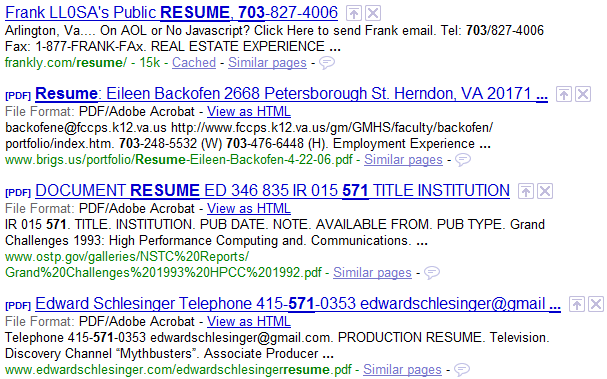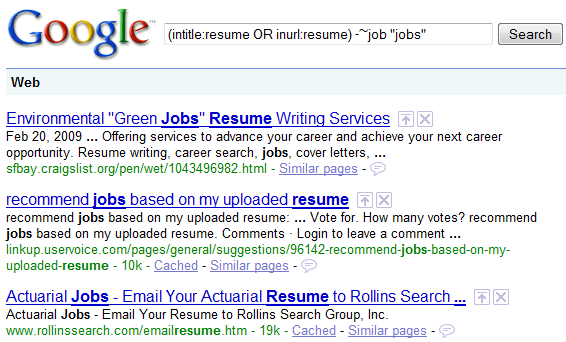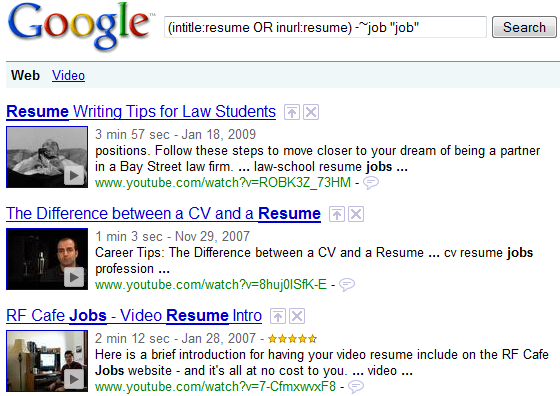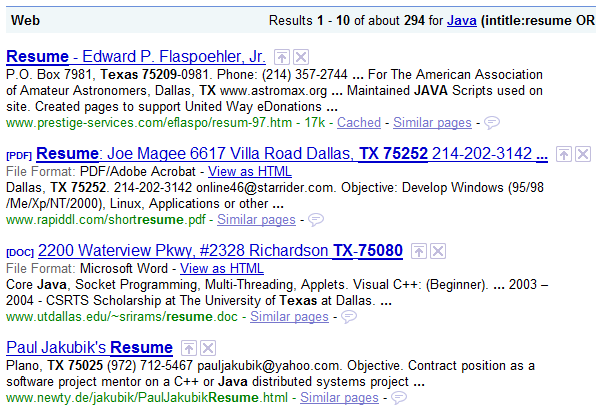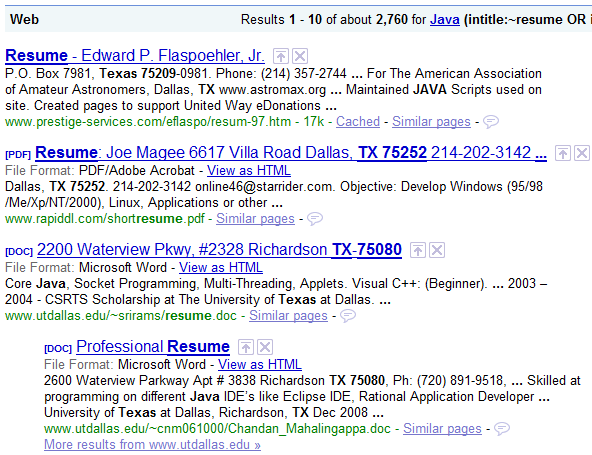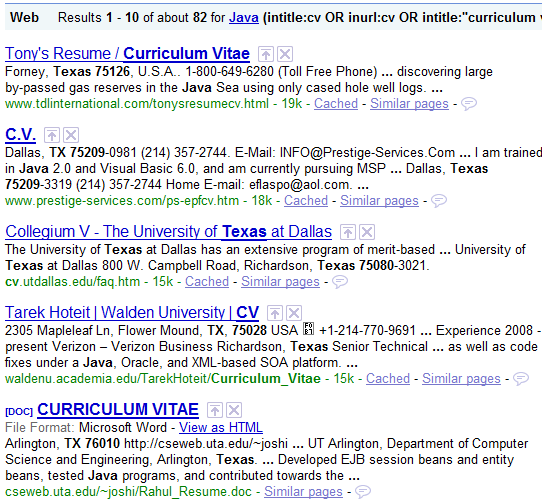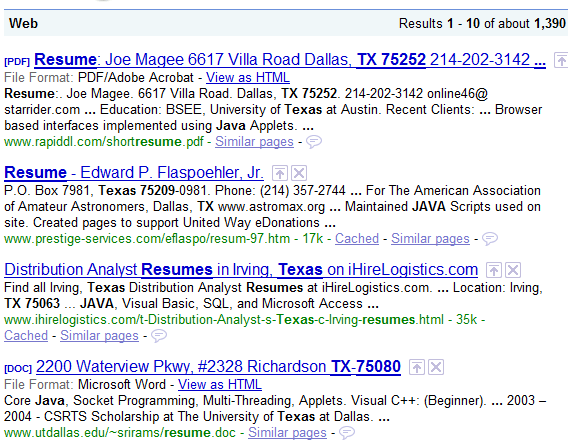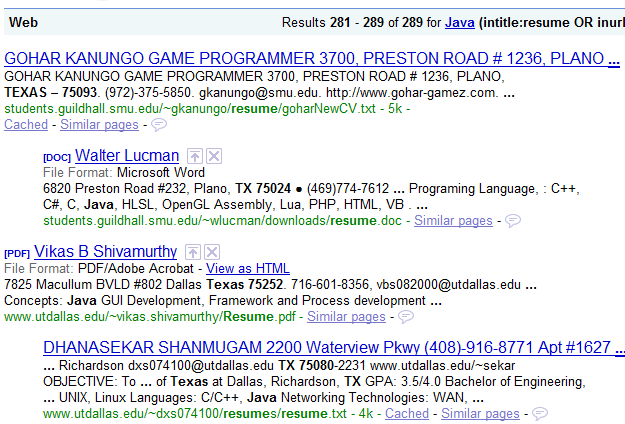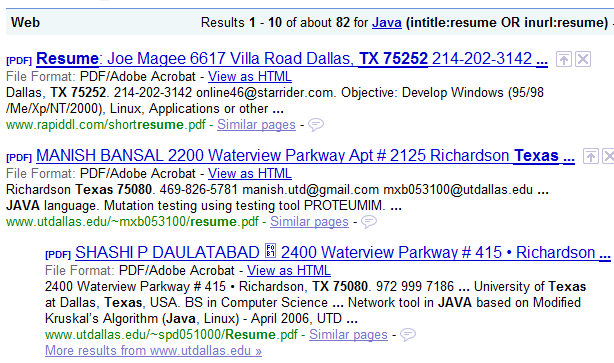Potential Interview Questions
Collected from Internet sources like Monster.com, About.com and few more
The best interview questions tell you about the person behind the resume, revealing the job candidate’s personality, strengths, weaknesses, knowledge, skills and abilities.
The best interview questions also benefit job seekers by giving them an opportunity to speak to details that don’t fit on a resume.
While a savvy interviewer always includes questions tailored to the position, our list of the 10 best questions works across a variety of industries and job descriptions:
1. From everything you’ve learned about this role, me and our company, tell me how you feel you’d make a contribution.
This interview question sorts people into two categories: contenders and also-rans.
“Those who have really prepared will love this opportunity to shine and stand out, demonstrating that they have done all the homework that can absolutely be done in today’s world of instant information,” says Darrell W. Gurney, career coach and author of Never Apply for a Job Again: Break the Rules, Cut the Line, Beat the Rest.
“Those who haven’t will stumble and try to put some generic response together, which will be obvious.”
2. Why should we hire you?
This is among the best interview questions because it asks job candidates to define what sets them apart from the intense competition in today’s job market, says Doug Schade, principal & supervising executive recruiter, Winter, Wyman & Company -- New York Accounting & Finance.
Faced with a big stack of resumes telling a similar story, this question helps you determine the best candidate.
An interviewee who does a great job explaining how her unique experience, education, industry credentials, and personal interests will power your business will do the same thing for your company once hired.
3. If you could start your career over again, what would you do differently?
While no one likes to dwell on past regrets, this can be a good question to ask, says Brendan Courtney, president of staffing firms Randstad Finance & Accounting and The Mergis Group, Boston.
Asking a candidate to explain the major decisions he has made, highlighting the positive and negative, reveals the person’s ability to make calculated decisions based on past professional and personal experiences.
It also lets candidates share their vision for the future and their ambitions.
4. When I contact your last supervisor and ask which area of your work needs the most improvement, what will I learn?
“I love this question because it’s the one that actually garners an honest response from the candidate,” says career coach Lauren Milligan of ResuMayday, a Warrenville, Illinois, career-counseling firm.
“No amount of finesse will influence this answer because when the supervisor is brought into the conversation, the candidate knows the truth will come out anyway. Essentially, it’s the same question as ‘what is your biggest weakness,’ phrased in an unexpected way.”
5. Describe the best boss you ever reported to.
This is a great interview question because it tells you about past relationships, says Kathy Downs, recruiting manager, Robert Half Finance & Accounting, Menlo Park, California.
“Because it highlights the personality and work types the applicant meshes with best, the interviewer can gain greater insights into the candidate’s communication skills, work style and potential cultural fit,” she says.
Follow up with questions about what made the relationship click -- was it personality, performance, or perhaps a cheerleader type of boss? Does the candidate prefer autonomy to handholding, or was he inspired by a mutual drive to achieve organizational goals?
6. Tell me about what motivates you.
7. What frustrates you?
Ask these questions in sequence to better understand the interviewee’s motivations, explains Janette Marx, SVP with Adecco Staffing US, Melville, N.Y.
If what drives the interviewee matches the position and your corporate culture, you have a winner.
When the candidate then talks about past frustrations, he reveals details about his personality, diplomacy skills and ability to work on teams.
Does the candidate answer by discussing minor irritations -- or ways that he successfully resolved serious conflicts over time, budgets, or priorities? The latter are candidates who have positive intelligence.
8. Tell me about the toughest negotiation you’ve ever been in.
Every job involves negotiation, and this question yields insight, not only in their direct negotiation skills, but also how the job seeker navigates difficult situations, Marx says.
The best negotiators answer this question by laying out both sides of the problem and then explaining how they aligned the issues or followed a process to a mutually-agreeable solution.
9. How do you involve your staff when an important company strategy decision needed to be made?
The candidate’s answer tells you whether a manager is secure enough to involve others in strategic decision-making, says Jayne Mattson, senior vice president, Keystone Associates, Boston, a career management firm.
How the job seeker involves his staff -- via written communication, one-on-one or in a group setting -- tells you a lot about their management style.
10. Where do you see yourself in five years?
With this question, it's not what the candidate says but how she says it that’s important, says Joey V. Price, CEO of Jumpstart HR, a managed HR services firm in Washington, D.C.
“If you see someone's eyes light up at the thought of the future, then you can tell this is a very ambitious person who knows where they want to go and will do everything in their power to help ensure your organization gets them there.”
There are various Internet sources giving us list of questions that we recruiters can ask. Here is a list created from few major sites.
Further in the later section of this page, I have collected here potential best 100 questions. Some are real basic questions to an extent that this may bore you but worth a look since this will avoid you from missing any potential good question. I always suggest my recruiters to highlight best questions from this list before they go ahead and interview a potential new hire.
The 10 Best Interview Questions to Ask
The best interview questions also benefit job seekers by giving them an opportunity to speak to details that don’t fit on a resume.
While a savvy interviewer always includes questions tailored to the position, our list of the 10 best questions works across a variety of industries and job descriptions:
1. From everything you’ve learned about this role, me and our company, tell me how you feel you’d make a contribution.
This interview question sorts people into two categories: contenders and also-rans.
“Those who have really prepared will love this opportunity to shine and stand out, demonstrating that they have done all the homework that can absolutely be done in today’s world of instant information,” says Darrell W. Gurney, career coach and author of Never Apply for a Job Again: Break the Rules, Cut the Line, Beat the Rest.
“Those who haven’t will stumble and try to put some generic response together, which will be obvious.”
2. Why should we hire you?
This is among the best interview questions because it asks job candidates to define what sets them apart from the intense competition in today’s job market, says Doug Schade, principal & supervising executive recruiter, Winter, Wyman & Company -- New York Accounting & Finance.
Faced with a big stack of resumes telling a similar story, this question helps you determine the best candidate.
An interviewee who does a great job explaining how her unique experience, education, industry credentials, and personal interests will power your business will do the same thing for your company once hired.
3. If you could start your career over again, what would you do differently?
While no one likes to dwell on past regrets, this can be a good question to ask, says Brendan Courtney, president of staffing firms Randstad Finance & Accounting and The Mergis Group, Boston.
Asking a candidate to explain the major decisions he has made, highlighting the positive and negative, reveals the person’s ability to make calculated decisions based on past professional and personal experiences.
It also lets candidates share their vision for the future and their ambitions.
4. When I contact your last supervisor and ask which area of your work needs the most improvement, what will I learn?
“I love this question because it’s the one that actually garners an honest response from the candidate,” says career coach Lauren Milligan of ResuMayday, a Warrenville, Illinois, career-counseling firm.
“No amount of finesse will influence this answer because when the supervisor is brought into the conversation, the candidate knows the truth will come out anyway. Essentially, it’s the same question as ‘what is your biggest weakness,’ phrased in an unexpected way.”
5. Describe the best boss you ever reported to.
This is a great interview question because it tells you about past relationships, says Kathy Downs, recruiting manager, Robert Half Finance & Accounting, Menlo Park, California.
“Because it highlights the personality and work types the applicant meshes with best, the interviewer can gain greater insights into the candidate’s communication skills, work style and potential cultural fit,” she says.
Follow up with questions about what made the relationship click -- was it personality, performance, or perhaps a cheerleader type of boss? Does the candidate prefer autonomy to handholding, or was he inspired by a mutual drive to achieve organizational goals?
6. Tell me about what motivates you.
7. What frustrates you?
Ask these questions in sequence to better understand the interviewee’s motivations, explains Janette Marx, SVP with Adecco Staffing US, Melville, N.Y.
If what drives the interviewee matches the position and your corporate culture, you have a winner.
When the candidate then talks about past frustrations, he reveals details about his personality, diplomacy skills and ability to work on teams.
Does the candidate answer by discussing minor irritations -- or ways that he successfully resolved serious conflicts over time, budgets, or priorities? The latter are candidates who have positive intelligence.
8. Tell me about the toughest negotiation you’ve ever been in.
Every job involves negotiation, and this question yields insight, not only in their direct negotiation skills, but also how the job seeker navigates difficult situations, Marx says.
The best negotiators answer this question by laying out both sides of the problem and then explaining how they aligned the issues or followed a process to a mutually-agreeable solution.
9. How do you involve your staff when an important company strategy decision needed to be made?
The candidate’s answer tells you whether a manager is secure enough to involve others in strategic decision-making, says Jayne Mattson, senior vice president, Keystone Associates, Boston, a career management firm.
How the job seeker involves his staff -- via written communication, one-on-one or in a group setting -- tells you a lot about their management style.
10. Where do you see yourself in five years?
With this question, it's not what the candidate says but how she says it that’s important, says Joey V. Price, CEO of Jumpstart HR, a managed HR services firm in Washington, D.C.
“If you see someone's eyes light up at the thought of the future, then you can tell this is a very ambitious person who knows where they want to go and will do everything in their power to help ensure your organization gets them there.”
Other 100 Best Interview Questions to Ask
- Tell me about yourself starting from your family, education and experience background.
- What are your strengths? OR you can also ask - If I ask your boss to list your strength areas what will he / she answer.
- What are your weaknesses? Similar to above - If I ask your friend to list your three key strength areas, what will he / she answer.
- Who was your favorite manager and why?
- What kind of personality do you work best with and why?
- Why do you want this job?
- Where would you like to be in your career five years from now?
- Tell me about your proudest achievement.
- If you were at a business lunch and you ordered a rare steak and they brought it to you well done, what would you do?
- If I were to give you this salary you requested but let you write your job description for the next year, what would it say?
- Why is there fuzz on a tennis ball?
- How would you go about establishing your credibility quickly with the team?
- There's no right or wrong answer, but if you could be anywhere in the world right now, where would you be?
- How would you feel about working for someone who knows less than you?
- Was there a person in your career who really made a difference?
- What's your ideal company?
- What attracted you to this company?
- What are you most proud of?
- What are you looking for in terms of career development?
- What do you look for in terms of culture -- structured or entrepreneurial?
- What do you like to do?
- Give examples of ideas you've had or implemented.
- What are your lifelong dreams?
- What do you ultimately want to become?
- How would you describe your work style?
- What kind of car do you drive?
- Tell me about a time where you had to deal with conflict on the job.
- What's the last book you read?
- What magazines do you subscribe to?
- What would be your ideal working situation?
- Why should we hire you?
- What did you like least about your last job?
- What do you think of your previous boss?
- How do you think I rate as an interviewer?
- Do you have any questions for me?
- When were you most satisfied in your job?
- What can you do for us that other candidates can't?
- What are three positive things your last boss would say about you?
- What negative thing would your last boss say about you?
- If you were an animal, which one would you want to be?
- What salary are you seeking?
- What's your salary history?
- Do you have plans to have children in the near future?
- What were the responsibilities of your last position?
- What do you know about this industry?
- What do you know about our company?
- How long will it take for you to make a significant contribution?
- Are you willing to relocate?
- What was the last project you headed up, and what was its outcome?
- What kind of goals would you have in mind if you got this job?
- Give me an example of a time that you felt you went above and beyond the call of duty at work.
- What would you do if you won the lottery?
- Can you describe a time when your work was criticized?
- Have you ever been on a team where someone was not pulling their own weight? How did you handle it?
- What is your personal mission statement?
- Tell me about a time when you had to give someone difficult feedback. How did you handle it?
- What is your greatest failure, and what did you learn from it?
- What irritates you about other people, and how do you deal with it?
- What is your greatest fear?
- Who has impacted you most in your career, and how?
- What do you see yourself doing within the first 30 days of this job?
- What's the most important thing you've learned in school?
- What three character traits would your friends use to describe you?
- What will you miss about your present/last job?
- If you were interviewing someone for this position, what traits would you look for?
- List five words that describe your character.
- What is your greatest achievement outside of work?
- Sell me this pencil.
- If I were your supervisor and asked you to do something that you disagreed with, what would you do?
- Do you think a leader should be feared or liked?
- What's the most difficult decision you've made in the last two years?
- What do you like to do for fun?
- Why are you leaving your present job?
- What do you do in your spare time?
- How do you feel about taking no for an answer?
- What was the most difficult period in your life, and how did you deal with it?
- What is your favorite memory from childhood?
- Give me an example of a time you did something wrong. How did you handle it?
- Tell me one thing about yourself you wouldn't want me to know.
- Tell me the difference between good and exceptional.
- Why did your choose your major?
- What are the qualities of a good leader? A bad leader?
- What is your biggest regret, and why?
- What are three positive character traits you don't have?
- What irritates you about other people, and how do you deal with it?
- If you found out your company was doing something against the law, like fraud, what would you do?
- How many times do a clock's hands overlap in a day?
- How would you weigh a plane without scales?
- What assignment was too difficult for you, and how did you resolve the issue?
- If I were to ask your last supervisor to provide you additional training or exposure, what would she suggest?
- If you could choose one superhero power, what would it be and why?
- What's the best movie you've seen in the last year?
- Describe how you would handle a situation if you were required to finish multiple tasks by the end of the day, and there was no conceivable way that you could finish them.
- What techniques and tools do you use to keep yourself organized?
- If you could get rid of any one of the provinces, which one would you get rid of, and why?
- With your eyes closed, tell me step-by-step how to tie my shoes.
- If you had to choose one, would you consider yourself a big-picture person or a detail-oriented person?
- If selected for this position, can you describe your strategy for the first 90 days?
- Who are your heroes?
- Tell me 10 ways to use a pencil other than writing.


